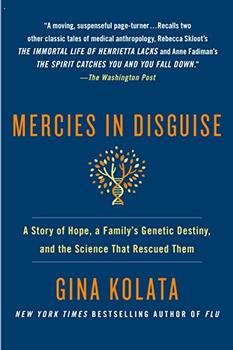Summary | Excerpt | Reading Guide | Reviews | Beyond the Book | Read-Alikes | Genres & Themes | Author Bio

A Story of Hope, a Family's Genetic Destiny, and the Science That Rescued Them
by Gina KolataThis article relates to Mercies in Disguise
Mercies in Disguise discusses the impact of a rare genetic disease on a South Carolina family.
Genetic testing's history dates back to the discovery of chromosomes – the part of the cell that contains the genes which control how a living thing grows – in the late 1800s. It was early in the 1900s that inherited diseases were first linked to chromosomes. In the 1950s, discoveries relating to the science of genetics allowed the development of tests for genetic conditions including Down syndrome, cystic fibrosis and some forms of muscular dystrophy. Advances in the field have led us to the point where genetic testing is available for over 2000 rare and common conditions, and is provided from over 500 laboratories across the globe.
Modern testing involves taking a sample of a person's DNA from their saliva or blood and then generally sending it to a lab to check for abnormalities, comparing the results to a vast database accumulated over time of what a "normal" gene looks like. Through continued research and testing, over the decades scientists have built a library of these altered genes that are increasingly used to determine an individual's propensity to develop certain diseases.
A specific variation may be inherited (that is, passed down through one's parents or grandparents) or caused by a chromosomal abnormality. This can lead to a genetic predisposition or genetic susceptibility to a particular ailment. As the descriptions indicate, having a predisposition or susceptibility does not mean the affected person will develop the identified illness over their lifetime; it simply indicates an increased likelihood of doing so. Some individuals with an identified genetic variation will never get ill. Oftentimes, the variations contribute to the development of the disease but don't directly cause it; lifestyle and environment can also impact whether or not someone with a genetic predisposition will get the specific disease.
Most genetic disorders aren't rare like the Gerstmann-Straussler-Scheinker (GSS) disease afflicting Amanda Baxleys' family in Mercies in Disguise. Cancer, diabetes and heart disease all have a genetic component to them. Because inheritance patterns are so varied and complex, and because outside factors also impact whether or not someone will develop the identified disease, risk can often only be estimated. There are also different risks ratios for different diseases; for example, melanoma is considered about 21% genetic and 79% environmental (i.e., sun exposure) while type 1 diabetes is more like 88% genetic and 12% environmental.
According to The University of Utah, there are some identified risk factors for genetic predisposition that may lead one to seek testing:
Medical science has recently allowed for quick, inexpensive genetic testing at the consumer level, but these tests are highly controversial. First, there's some debate about their accuracy. In 2013 the FDA prohibited 23AndMe, the largest genetic testing agency in the USA, from providing health-related results to consumers due to concerns about the company's ability to provide reliable results. They are permitted to sell heritage-based results, and discussions with the FDA regarding health-related results continues. The company subsequently moved offices to Canada and the UK, from whence they continue to provide these services. There is also a great deal of concern that the lack of pre- and post-test information and counseling to help people understand the results will do more harm than good.
People who suspect they may have a genetic disposition for a disease face the serious and potentially life-altering decision whether or not to get tested. In favor of testing is that if a test is negative it can lead to peace of mind and less need for ongoing screenings, while if the test is positive it can lead to getting treatment quicker and/or taking steps to mitigate risk factors, and may prompt important family planning decisions.
If you're considering getting screened for a specific disease, scienceprogress.org offers the following questions to consider:
by Kim Kovacs
Filed under Medicine, Science and Tech
![]() This "beyond the book article" relates to Mercies in Disguise. It originally ran in April 2017 and has been updated for the
April 2018 paperback edition.
Go to magazine.
This "beyond the book article" relates to Mercies in Disguise. It originally ran in April 2017 and has been updated for the
April 2018 paperback edition.
Go to magazine.
Your guide toexceptional books
BookBrowse seeks out and recommends the best in contemporary fiction and nonfiction—books that not only engage and entertain but also deepen our understanding of ourselves and the world around us.